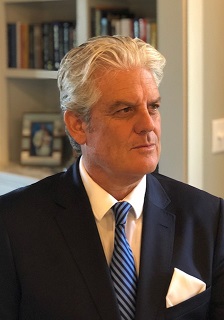From the CEO – May 2021
 Dear Clients,
Dear Clients,
The distinction between political risk in developed versus emerging or frontier markets began to blur some two decades ago (arguably with 9-11) and has become even less marked over the past decade with such events as the Brexit vote and the election of Donald Trump in the US. As such, political risk is no longer the sole preserve of emerging markets – characterized as they are by relatively high levels of corruption and the threat of nationalization of private assets – but rather something that is distributed among jurisdictions, with developed markets holding their own, more unique, dangers to investors, from unscripted changes in monetary policy to regulatory creep.
However, what was also apparent at the time – and indeed continues largely to this day – is that the depth of the analyses of developed market political risk was quite shallow, at least in contrast to the efforts applied to their emerging market cousins. Dominated by the financial and popular press, rarely would we come across something equaling probes of, for example, the factors that fashion the behavior of the main actors involved in Argentina’s debt repayments, or the real effect of US sanctions against Iran. Instead, we are left guessing or accepting the simplicity of the event.
The pandemic we’ve all being living through for the past year or so might offer some respite. Not only have we seen studies that trace government responsiveness to COVID-19 outbreaks to overall stability and the form of government (centralized versus decentralized), but others as well that have considered the impact of the pandemic on exchange rate stability, the likelihood of social turmoil, and the relationship between lockdowns, business confidence, bond yields, equity market performance, and the quality of health care systems.
Indeed, focusing more on the many facets of developed market political risk is also worthwhile given the nature of recent capital flows. As Julian Campisi recently wrote in his chapter titled ‘Rethinking Political Risk Analysis in Developed Markets’ in my recent book I co-authored and co-edited with Peter Marber, Quid Periculum? Measuring & Managing Political Risk in the Age of Uncertainty, net FDI inflows to developed markets have fallen by over 10% since the financial crisis of 2007/08 to 2014/5. Along with these trends, a range of metrics designed to measure operating risks in developed markets – from corruption to business freedom, to democratic accountability to international competitiveness – have fallen similarly.
Turning to the ratings this month a few standouts are worth mentioning. In the Americas, foreign exchange reserves are running low in Trinidad and Tobago, although there is talk of a USD swap to alleviate the pressure and help future financing needs. The opposition in Nicaragua has effectively collapsed ahead of the election, as poverty cases mount and business complains about the behavior of security forces.
In Europe, we are watching yields on Italian government paper inch up, as uncertainty over the composition of the next parliament looms on the horizon. Returning to its Atlantis foreign policy bent, the government has also recently blocked a Chinese buyout effort of a semiconductor business. Slovenia’s PM, Janez Jansa, survived another impeachment vote, as we expect him to double down on the opposition and the media. The West condemns the latest actions by Lukashenko in Belarus, while Bulgaria prepares for fresh elections in July under its caretaker government.
In Asia, Japanese PM Suga’s approval rating has hit a new low after the state of emergency was extended to combat rising COVID-19 infections. Well over half of the Japanese polled say the government has botched its effort to control the pandemic. Malaysia imposes a new lockdown, as both the markets and the government’s popularity slip.
In Africa, Sierra Leone’s government closes some mining firms, as the poverty rate pushes 70% of the population. Most say inflation is running hot, too. However, a brighter picture for South Africa became as the suspension of one of President Ramaphosa’s political rivals has strengthened his grip on the ruling ANC. Investors cheered on the news.
Finally, in the Middle East, some $128bn in foreign reserves has been found to be missing in Turkey, while the US gives Tunisia $500mn in aid for infrastructure development. Tunisian authorities are also looking at $4bn loan from the IMF, while protests have eased along with the latest lockdown.
Our new book Quid Periculum? Measuring & Managing Political Risk in the Age of Uncertainty, co-edited and co-authored by Peter Marber (Harvard/Aperture Investors) is now available! The book includes such diverse topics as risk forecasting techniques, reliability measures, the impact of political risk on asset prices and sovereign debt workouts. Also featured is a special roundtable discussion by some of the world’s leading voices in the field on the future of political risk, who combine to address some of the challenges presented by globalization and COVID-19. For more information and to reserve a copy of the book, please contact Louis Carroll, PRS’ Director of Business Development, at lcarroll@prsgroup.com.
May was another productive month for new and returning clients, ranging from some of the world’s top universities to the largest institutional investors throughout the US, Europe, the UK, and the Middle East and Asia.
We are also pleased to be concluding our preliminary assessment of Uzbekistan’s risk profile for the Finance Ministry in an effort to bring that country into the ICRG fold and have it ranked alongside the 140 countries contained in the index.
We are also happy to be working with Elanco – a world leader in developing innovative products and solutions that enhance animal health – to provide select risk profiles of a number of Asian countries not covered by PRS. With Elanco, our client base continues to expand to include firms from a variety of commercial backgrounds as our data and risk forecasting next to no other in terms of its multiple applications.
Not only is ICRG being used by some of the world’s largest technology firms, but the data are now being incorporated increasingly into the artificial intelligence/machine learning space, with an emphasis on ESG data! On this score, we are especially pleased that our data are being used by an increasing number of institutional investors as the empirical connection between our select risk indicators and various asset classes become more pronounced and tradable. Be sure to contact us for our select ESG data bundles.
We are also delighted to mention that PRS will be completing its re-branding process this year which will include a new look that pays homage to our 40+ year history, along with various events that helped lay the foundation for our work – some of which extend to the introduction of the Hindu Arabic number system in the Renaissance period and a now famous exchange of letters between Blaise Pascal and Pierre de Fermat in 1654. As part of the new-look PRS, we will continue to unveil new products which include data bundles of particular importance to the academic world and more timely country risk forecasts available online.
Our ICRG political risk scoring changes were very robust in May, affecting over 80 countries (of 140) and over 100 individual political risk metrics!!
ICRG and related PRS data continue to be the gold standard of all geopolitical risk data among the scholarly and research communities. As noted in Quid Periculum, the ICRG series has the power to differentiate the effects of political risk on investment values across countries and time. Relating to the value of petroleum reserves (something quite relevant given expected higher prices as the oil glut from the pandemic recedes), it was shown that the political risk discount on valuation is substantial and highly statistically significant. See chapter 12, ‘Political Risk Spreads.’)
Thanks for your continued support, and please contact us if we can be of any assistance.

Chief Executive

PRS INSIGHTS
Moving beyond current opinions, a seasoned look into the most pressing issues affecting geopolitical risk today.
EXPLORE INSIGHTS SUBSCRIBE TO INSIGHTS
